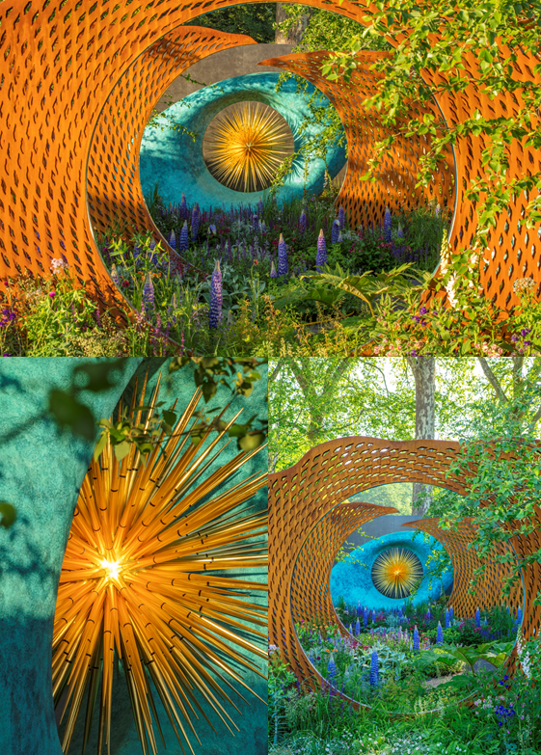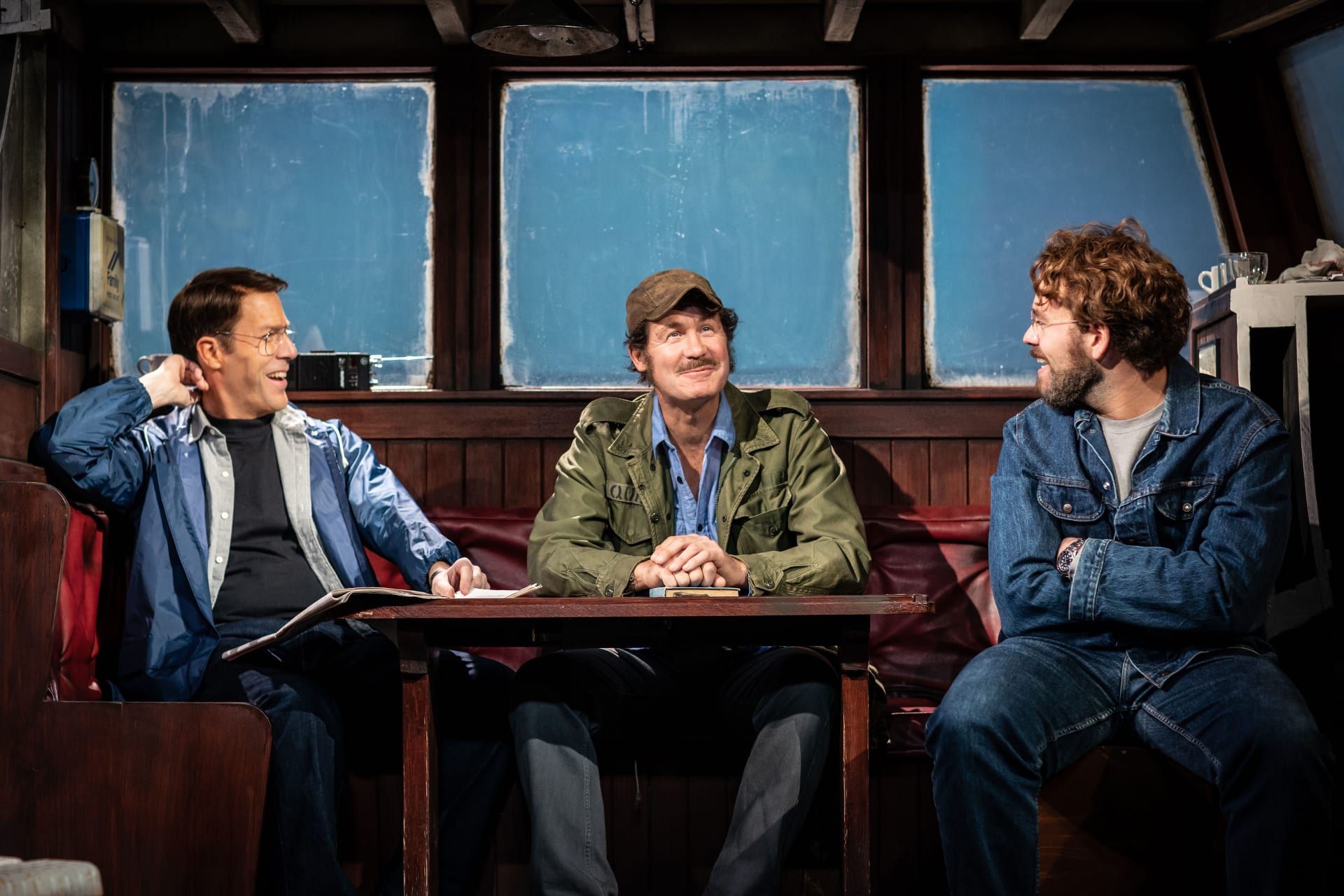“You need to interact with a sculpture. It’s great to see it being made; the sparks, the metal, the energy, the passion. But it’s also nice to see it doing its job: to sit in an environment and tell a story. I’m very passionate about the fact that the story isn’t necessarily about the piece, but what it reflects and how it works with its environment.”
“I had no formal training,” sculptor David Harber says at the workshop of his eponymously named business. He left school at 15 or 16, for a “rather chequered career”. He was an apprentice potter, a thatcher, a rock-climbing instructor, and a mountaineering cameraman; he also toured Europe for eight years in a boat he’d adapted to be a floating theatre. “Everything I've ever done has been a leap of faith,” says the 62-year-old. “I wasn’t a mountaineer when I became a mountaineering cameraman – I certainly wasn't a cameraman. I knew nothing about boats when I bought my 160-ton coaster, I knew nothing about theatre, but I converted the boat into a theatre.”
He returned from his nautical endeavour “and started making sun dials out of necessity”, his first in a converted pigsty outside Henley. “Most people would have got a regular job, but I made a sun dial, sold it, made another one, sold it. And hey presto – there was a small burgeoning cottage industry.” Twenty-five years on his company, operating from a converted barn outside Didcot and comprising 35 employees, sell sculptures “all over the world to the craziest places”. Added to which, in 2016 they received ‘the Queen’s Award for International Trade for outstanding overseas growth while remaining committed to British design and craftsmanship’.
Roughly 20 years ago, David Harber did its first RHS Chelsea Flower Show. “We had a very modest, little tradestand.” He recalls assembling it the night before they opened, with his wife Sophie. Whereas other holders would just lay out their products without much thought for decor, “we put down some terracotta tiles, we had a friend paint a mural on the back, we made a real effort.” In recognition of this, they were moved to a better site the next year. “Over the course of about ten years, we moved progressively to better site to better site to better site. It’s a bit like Monopoly; after ten years we ended up on Main Avenue, which is effectively Mayfair.” They’ve worked this dark blue region for about 12 years now, and were the first tradestand on that stretch – extraordinary, he says, when you consider the large national organisations present at Chelsea. “We – this small company from Oxfordshire – broke the mould. They allowed a tradestand onto this avenue, which is normally where the royals parade and all the show gardens are.”
People would often mistake their aesthetically pleasing stand for one of the show gardens. “Eventually we thought, ‘Why don't we do a show garden?’ We put our hat in the ring and because we had such a good track record of winning at the tradestand awards, the RHS let us do it, which we never thought they would.” So, last year David Harber partnered with estate agents Savills (“great to work with”) in sponsoring a Main Avenue garden exploring the impact of mankind through the ages. “Our garden was the most photographed of the show because it was very photogenic. Although it didn't do particularly well with the prize, we actually did incredibly well with the publicity.”
In 2019 – as well as running their well-established stand – they will again co-sponsor a garden with Savills, as designed by Andrew Duff. Chelsea is, states Harber, “the jewel in the crown of the horticultural year in Britain” and “the most prestigious garden show in the world by far”. It is also “such an emotional rollercoaster that it’s really important you’re working in a team where you all get on and support each other. There’s a lot of drama, a lot of pain, a lot of frustration, and a lot of elation. It is a really difficult thing to build an incredible garden over a two-week period that’s going to be scrutinised down to the last leaf by judges, so it’s a very stressful time. But if you’re working with people you like and trust, that’s half the battle.”

The David Harber and Savills Show Garden
© Clive Nichols
2019’s garden celebrates the environmental benefit trees, plants and grass can have in urban spaces, as well as the beauty they can bring to them. “Pollution, greening of urban spaces, and air quality are incredibly hot topics at the moment,” he points out. They’ve been “just ahead of the curve”, deciding on the garden’s theme almost a year ago. The premise has been led by Savills, “but we've embraced it and Andrew Duff is implementing it. In fact, we chose Andrew because his ethos lends itself to the brief.” Featuring about 1,000 perennial plants, the space’s message of environmental improvement is of course key, “but a very strong element of it for me, and for Andrew, is that it is a sanctuary. We all rush around, we are frantically busy, distracted, overwrought. To have somewhere that is peaceful, cathartic, with trees and water, is essential. It’s almost like a temple, it's got no specific religious connotations, it is purely and simply a place of calm. Gardens are glorious therapeutic environments, whether you’re tending to them on your knees with grubby hands, or just walking through them and being imbued with the stillness of nature.”
Eighteen mature trees will surround a pond – “very simple, very clean” – in the centre of which will be David Harber’s contribution, “a rather tall, elegant sculpture cast in bronze, which is standing and reflecting perfectly in the water. It’s sort of inspired by Excalibur, the Lady of the Lake; something rising out of this water – a symbol of hope and renewal. We’ve also got a rather clever pattern of petals floating on the water in front of it, which are computer controlled to create a beguiling, magical movement – if we get it working properly.”
But is the beauty of this show garden achievable for people at home? “Absolutely.” There are some “enormous-budget” Chelsea offerings “totally implausible” for the gardens of those visiting them. But this one, he says, you could drop out back of an Oxford or London dwelling “and it would make sense”.
Insofar as the work of David Harber goes generally, the man at the helm doesn’t get his “hands dirty in the workshop on a daily basis” any more –though aware of what’s being built and ready to voice an opinion on how things should be done. “I’ve got incredible craftspeople working for me. What I’m hoping to do is spend more time designing sculptures and meeting clients.” He favours walking around customers’ gardens, coffee in hand, discussing “why they want me to look at the garden, and how I can make something special for them. There are dozens and dozens and dozens in the Oxfordshire area; private clients who’ve become friends because we’ve enhanced their world. It isn’t very commercial from our point of view, because quite often I spend more time than I should designing with them. But at the end of the day, the client has a piece in their garden from us, and very often there’s an ongoing relationship as a result.”
They’re in the piece too though, right? “Absolutely. If I had an ego, which I like to think I don’t, I would make a piece and say take it or leave it.” But he wants to make for clients, “to make sure they like the idea and are getting what they want. The piece I’m making is for them, for that location, that’s really important. Otherwise we’d just be saying, ‘Have a look at number 23B from the catalogue.’"
RHS Chelsea Flower Show takes place 21-25 May.








